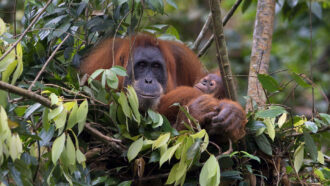All Stories
-
 Health & Medicine
Health & MedicineUse of injectable GLP-1 weight-loss drugs skyrockets among teens
Their long-term safety is still an issue for kids. Meanwhile, a new vibrating robotic pill in early trials might offer an edible alternative to GLP-1s.
-
 Physics
PhysicsScience reveals the reasons behind painful paper cuts
Some types of paper are more likely to cause paper cuts. It’s the paper’s thickness and slicing angle that matter, physicists conclude.
-
 Space
SpaceScientists Say: Kugelblitz
A black hole made of pure light —or kugelblitz — may be possible, at least in theory. But in practice: impossible.
-
 Artificial Intelligence
Artificial IntelligenceThe brain of a tiny worm inspired a new type of AI
A liquid neural network mimics how neurons interact in the brain of a worm. This type of AI can better adapt to new situations.
-
 Humans
HumansRain Bosworth studies how deaf kids experience the world
This deaf experimental psychologist has found that babies are born ready to learn sign language, just like spoken language.
By Meghan Rosen -
 Earth
EarthAs Yellowstone’s supervolcano slumbers, another big danger lurks
Superheated water beneath Yellowstone could fuel hydrothermal explosions with the force of an atomic bomb. And lessons from the past suggest they could happen today.
By Douglas Fox -
 Tech
TechNew system uses evaporation to greatly cool artificial turf
It relies on rainwater that gets stored below a field of plastic "grass." The design also limits how much rain — and pollution — will run off artificial turf.
By Laura Allen -
 Physics
PhysicsExperiment: Making music with bottles
In this study, we investigate how the volume of air inside a bottle affects the pitch of the musical notes it can create.
-
 Animals
AnimalsLet’s learn about orangutans
These shaggy, red-haired apes are more solitary than other primates, but moms and babies share a strong bond.
-
 Physics
PhysicsScientists Say: Magnetosphere
This magnetic field encapsulates our planet, sheltering us from damaging energetic threats posed by the cosmos and our own sun.
-
 Planets
Planets‘Percy,’ NASA’s rover, finds its first hint of ancient life on Mars
The robot examined a Mars rock containing organic compounds and “leopard spots.” On Earth, such spots usually come from microbial life.
-
 Tech
TechWant to spot a deepfake? Focus on the eyes
A technique from astronomy could help detect deepfakes by spotting unrealistic reflections in the eyes of AI-generated images.
By Ananya